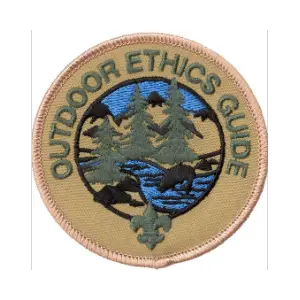About the Outdoor Ethics Guide Position
Scouts BSA is an organization that emphasizes the importance of the outdoors in character and leadership development. To ensure that Scouts have a deep appreciation for and respect towards nature, the Scouts BSA has established the Outdoor Ethics program. As a part of this program, the position of Outdoor Ethics Guide has been created to help educate and promote responsible outdoor behavior among Scouts.

The Outdoor Ethics Guide is a youth leadership position within a Scouts BSA troop. They are responsible for promoting responsible outdoor ethics, leading by example and encouraging other troop members to follow suit. The guide plays a crucial role in ensuring that Scouts develop an understanding of their role in nature and learn how to minimize their impact on the environment.
One of the key responsibilities of the Outdoor Ethics Guide is to help educate fellow Scouts on responsible outdoor behavior. This includes promoting the principles of Leave No Trace, a set of outdoor ethics that encourages minimal impact on the environment when camping, hiking or enjoying outdoor activities. The Guide is also responsible for planning and leading activities that promote responsible outdoor ethics within the troop.
Another important role of the Outdoor Ethics Guide is to encourage Scouts to take responsibility for their actions and to minimize their impact on the environment. This includes modeling and promoting behaviors such as carrying out all trash, using designated campsites, and respecting wildlife and natural resources.
As a leader within the Scouts BSA troop, the Outdoor Ethics Guide is expected to lead by example and adhere to the values of the Scout Oath and Law. By living up to these values, the Guide can promote respect, kindness, and responsibility towards nature, as well as demonstrate a strong commitment to service and community. In this way, the Outdoor Ethics Guide helps to instill a sense of pride and respect for the environment in fellow Scouts, while also fostering a sense of leadership and community within the troop.
The description below represents an example of the requirements and expectations for this position in one troop. Specifics can vary from one troop to another.
The printable copy also includes a self evaluation form for the position on the second page. Youth leaders might benefit from self evaluating during their term. If you use this, then keep it positive with them. It should only be used to help them recognize areas they should be working on.
Outdoor Ethics Guide Qualifications and Duties
This is just an example. Adjust as needed to meet the size, customs, and needs of your unit.
Qualifications:
- Appointed by Senior Patrol Leader and Assistant Senior Patrol Leader with Scoutmaster approval
- First Class Rank (Not a BSA requirement)
Reports to: the Assistant Senior Patrol Leader
Trained by: Assistant Senior Patrol Leader with assistance from the Assistant Scoutmaster for Older Scouts
May not serve three consecutive terms
Leave No Trace Trainer duties:
- Know the Leave No Trace principles, Outdoor Code, and Tread Lightly principles, and be able to explain them in detail to others.
- Explains to Scouts the relevant requirements for the Tenderfoot, Second Class, and First Class ranks.
- Instruct the troop about outdoor ethics principles before outings.
- While on outings, ensure that outdoor ethics principles are followed, providing direction and instruction as necessary.
- Arrive 5 minutes before the start of troop meetings.
- Participate in outings. Attendance expectation 80%
- Attend troop meetings. Attendance expectation 30%
- Set a good example.
- Wear the field uniform (class A) correctly to all regular troop meetings and religious services.
- Wear the activity uniform (class B t-shirt) to all outings and other troop activities.
- Live by the Scout Oath and Law.
- Show Scout spirit.
Frequently Asked Questions
Is there a minimum age or rank requirement for Outdoor Ethics Guide?
There is not a minimum set by BSA. However troops may set their own qualifications based on the size of their troop and the maturity of their troop. For example, since the Outdoor Ethics Guide is expected to explain requirements for the Tenderfoot, Second Class, and First Class ranks, a troop might ask that candidates for this position already have completed First Class.


Leave a Reply